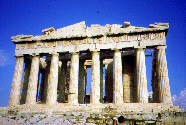Highlands Ranch High School - Mr. Sedivy
Highlands Ranch, Colorado

World
History
Athenian Culture
Poetry
Homer featured people trying to live up to standards of courage
and honor. Pindar wrote poems that honored sports heroes. Sappho
wrote of friendship and love.
Drama
Poems evolved to songs and finally to drama when Thespis broke away
and spoke lines on his own. Plays were a big deal to the Athenians.
On opening day even prisoners were let out to attend.

Theater at Delphi
Tragedies
The Greek tragedies were plays that showed dignity in the face of
trouble. They showed how noble people could be. The Universe was
governed by fate or destiny in these plays. People who were too
stubborn or proud would be punished by destiny. Aeshylus, Sophocles,
and Euriopides wrote some of the great tragedies.
Comedies
The comedies of Aristophanes and others were satires of politics
and current events. History The Athenians were the first to examine
history with a critical eye. Herodutus and Thucydides were some
of the historians of the day. Artists and Architects Paintings and
sculptures showed the ideal person. The Athenians tried to make
structures fit with natural surroundings. Notice how the Parthenon
seems to grow up out of the rocks.

The Parthenon
Philosophy
Philosophy is the love of wisdom. The Greek philosophers started
with deep-seeded questions such as: "Why are humans here?" and "How
far is the universe?" Greeks looked for rational ways to explain
the natural world. They believed in natural laws, many of which
were wrong.
Pythagorus
Pythagorus believed the universe was arranged according to natural
laws. He discovered the Pythagorean Theorem, the relationship between
the sides of a right triangle.
Hypocrites
Hypocrites started a medical school and taught people to find the
reason for illnesses. He separated medicine from magic.
Socrates 469-399 BC
Socrates never wrote anything down. He believed that it was more
important to gain knowledge of human beings than to investigate
nature. He thought that one should get knowledge from reason, not
emotions. "The unexamined life is not worth living." He taught by
having discussions in which the truth of every statement was questioned.
Socrates was killed for his ideas.
Plato 427 - 347 BC
Plato was a student of Socrates. He believed that laws must serve
the best interests of everyone. He blamed democracy for the troubles
in Greece because too few had the brains to govern wisely. Plato
wanted philosopher kings.

Aristotle Studied Astronomy
Aristotle 384 - 322 BC
Aristotle studied everything (plants, animals, and astronomy). He
was the founder of science and biology. Aristotle analyzed speech
to see what made for effective speeches.
Thermopylae
"These men have come to fight us for the possession of the pass,
and for that struggle they are preparing. It is the common practice
of the Spartans to pay careful attention to their hair when they
are about to risk their lives. But I assure you that if you can
defeat these men and the rest of the Spartans, there is no other
people in the world who will dare to stand firm or lift a hand against
you. You have now to deal with the finest kingdom in Greece, and
with the bravest men."
"The Persians had in their army many men, but few
soldiers."

Statue of Zeus from Heraklion.
The Romans worshiped a similar god whom they called Jupiter.



![]() 9375 South Cresthill Lane
9375 South Cresthill Lane ![]() Highlands Ranch, Colorado 80126
Highlands Ranch, Colorado 80126 ![]() 303-471-7000
303-471-7000




